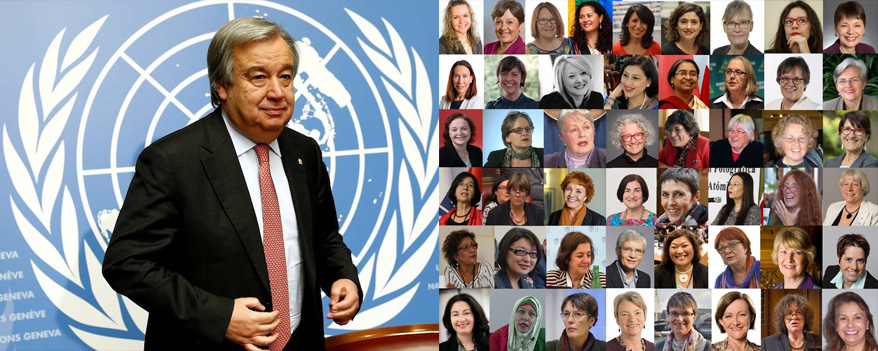Governments must make better use of diplomacy, international law and common security mechanisms in order to prevent war and adequately address climate change and nuclear threats, according an international appeal by women parliamentarians from around the world.
The appeal, Common security for a sustainable and nuclear-weapon-free world, was released to commemorate Women’s International Day for Peace and Disarmament (May 24) and to give support to Securing our Common Future: An Agenda for Disarmament, the new disarmament agenda released in Geneva on May 24 by UN Secretary-General Antonio Guterres. The appeal also commemorates the 175th birthday of Bertha von Suttner, the first women to receive the Nobel Peace Prize.
‘We are deeply concerned about the existential threats to humanity and the environment from climate change, nuclear weapons and unresolved international conflicts, especially those between nuclear-reliant countries,’ said Dr Hedy Fry MP (Canada), Co-Chair of the Canada Section of Parliamentarians for Nuclear Nonproliferation and Disarmament (PNND) and Special Representative on Gender Issues for the Parliamentary Assembly of the Organisation for Security and Cooperation in Europe (OSCE).
‘The withdrawal by the United States from the Iran Nuclear deal and the cancellation of the US/North Korea Summit only adds to these concerns,’ says Dr Fry. ‘As such, we welcome the peace and security initiative launched today by the United Nations Secretary-General – to “pursue disarmament to save humanity, disarmament that saves lives and disarmament for future generations.” ‘
‘The increased threats of nuclear-weapons-use by accident, miscalculation or intent led the Bulletin of the Atomic Scientists earlier this year to move the hands of the Doomsday Clock to 2 Minutes to Midnight,’ says Margret Kiener Nellen MP (Switzerland), President of the Swiss delegation to the OSCE Parliamentary Assembly.
‘Nuclear reliant governments must reverse this trend by taking all weapons systems off high alert, committing to never use nuclear weapons first, and commencing negotiations on the complete prohibition and elimination of nuclear weapons, as urged by the OSCE Parliamentary Assembly.’
‘We welcome the UN Secretary-General’s revamped agenda to “pursue disarmament to save humanity, disarmament that saves lives and disarmament for future generations,” ’ says Alyn Ware, PNND Global Coordinator. ‘The withdrawal by President Trump from the Iran Nuclear deal and the cancellation today of the US/North Korea Summit increases the imperative for this work.’
‘The first step is for all nuclear-reliant states to implement the call of the UN Secretary-General to “ensure that the 72-year practice of the non-use of nuclear weapons continues indefinitely and is universally understood to be an inviolable norm,” says Mr Ware. ‘The non-nuclear countries have made an important complementary action to this by negotiating last year a Treaty on the Prohibition of Nuclear Weapons. We look forward to ratification and entry into force of this treaty.’
‘Those countries that still rely on nuclear weapons for their security should phase out nuclear deterrence, replacing it with international law, common security mechanisms and verified multilateral disarmament,’ says Baroness Sue Miller (UK), PNND Co-President.
‘The United Nations was established with an array of mechanisms through which nations can resolve conflicts, negotiate disarmament and achieve security through diplomacy not war,’ says Baroness Miller. ‘These have been supplemented by additional common security mechanisms such as the Organisation for Security and Cooperation in Europe. A better use of these mechanisms could help facilitate nuclear disarmament.’
‘In addition, the nuclear arms race costs over $100 billion annually,’ says Ute Finckh-Krämer (Germany), former Deputy-Chair of the Bundestag Subcommittee on Disarmament and Arms Control. ‘These resources could be better used to reverse climate change, eliminate poverty and fulfill other social and economic needs.’
‘The condition of our world is calling for a new „Entspannungspolitik“, says Uta Zapf (Germany), PNND Past President and former Chair of the Bundestag Subcommittee on Disarmament and Arms Control.
‘The new peace and security initiative of UN Secretary-General Antonio Guterres arrives at the right moment. We have to end the dangerous arms race and we have to press states that rely on nuclear weapons and nuclear deterrence to put an end to these dangerous policies and strive instead for common security and peace.’
‘I call on all countries in the world to support this initiative,’ says Ms Zapf. ‘I ask all countries instead of financing arms races to use the money for the implementation of the Sustainable Development Goals.’
Rama Mani, Member of the World Future Council, is positive that peace and disarmament will unfold as civil society and governments cooperate more.
‘Soon…We shall hear the clattering, as their guns fall to the floor, As their missiles return to their hangars, As our resolve dissolves Their determination to destroy each other. …Soon.’
The statement Common security for a sustainable and nuclear-weapon-free world has been endorsed by legislators from Australia, Austria, Bangladesh, Canada, Chile, Costa Rica, Finland, Germany, Jordan, Kazakhstan, Lichtenstein, Marshall Islands, Mexico, Netherlands, New Zealand, Norway, Portugal, Scotland, Sweden, Switzerland and the United Kingdom.Nike

